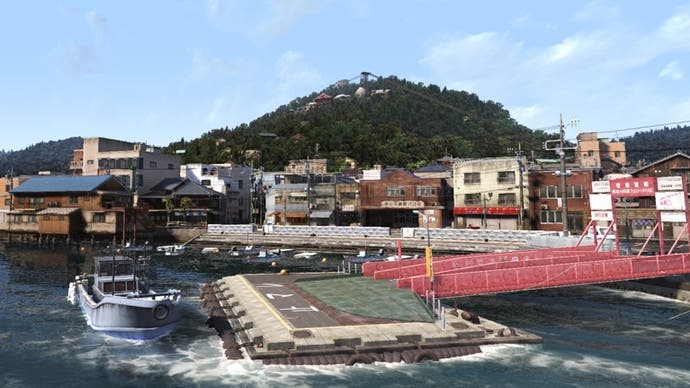After I stepped into Yakuza's world, Yakuza's world seeped into mine
Travel and memory as the real meets the virtual.
There's something magical about video games set in the real world. At the intersection of the fantastical and the mundane you get to become the hero of our very own world while taking in some of the most beautiful vistas our planet has to offer, all from the comfort of your couch.
For a long time, I had no particular feeling on the topic, since I had as much of a connection to contemporary Hong Kong or Seattle as I had to Skyrim and Mordor.
That changed on an overcast day in March 2012, when I was living my best life as an exchange student in Japan. I had flown to Okinawa with two friends to escape the surprisingly persistent, wet cold of early March, and on our first day, while we were idly exploring the town of Naha, it began to rain and we ducked into a roofed shopping district.
One of my friends urgently gestured around the damp and rundown alleyway with more fervour than it seemed to warrant at first glance and said, "Dude, we're in Yakuza!"
Here we were, in a small Japanese town with a bus service that ran three times a day, feeling as if we'd just come home to something.
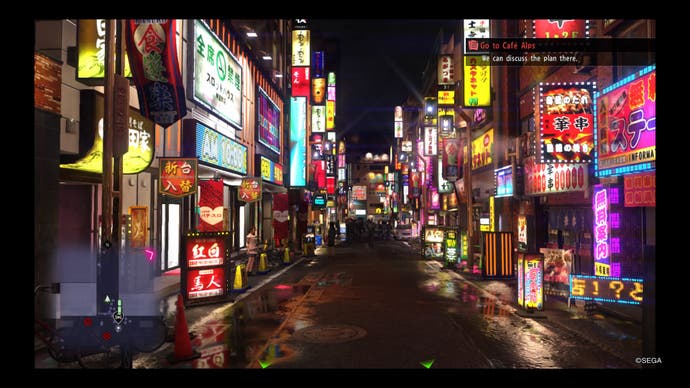
The Yakuza series has always been astoundingly unconcerned with marketing itself as virtual tourism, and I love it all the more for it. It was never geared towards Western audiences and thus no one saw the need to play up the exoticism of Japan. It consistently picks settings just this side of mundane and unattractive so that no Japanese player would think much of them, either. It's not designed to teach you anything about Japan.
Despite not being a game about its setting, Yakuza still gives you the best opportunity to really get engaged with a country and its people that I can think of. Most of the time, the protagonist Kiryu isn't the focus of anything that's going on in the world around him. He's not the hero people have desperately been waiting for - he was just in the neighbourhood. Due to his strong sense of justice it doesn't seem out of character for him to involve himself in other people's problems, and he's just clueless enough to act as a vessel for the introduction of concepts people may be unfamiliar with, whether that's online chat rooms or pro wrestling.
A lot of side quests are so surprising because they depict a relatable problem without posing Kiryu's appearance as the ultimate solution. Quests in Yakuza 6, for example, broach very real issues, such as elderly Japanese women donating all of their savings to weird cults, or the emotional consequences of rural exodus. Players can help with what they witness as passers-by, but there's always the implication that life goes on and that the people you've helped will have to find their own way eventually.
Yakuza doesn't deal in constant urgency. Instead, there is a time and place for everything, even if that's just pointedly doing nothing. You can take a break and not be punished for it with enemies descending on you from every corner the second you stop and look around. As I go fishing or enjoy my karaoke session, the world keeps turning.
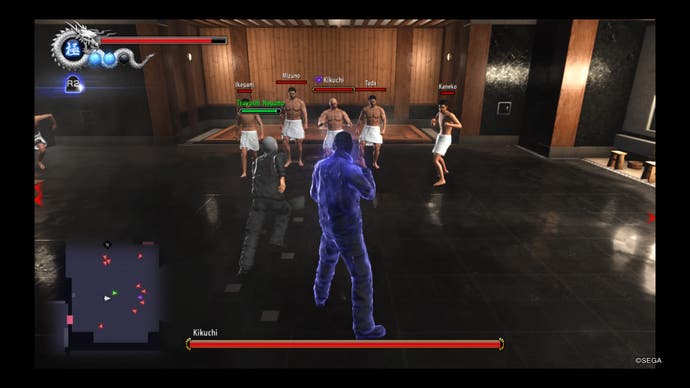
Years after returning from Japan, to me this general disinterest in the goings-on of the larger world and a surprisingly languid pace has come to characterise Japan better than neon signs and girls in school uniforms. Yakuza has become a connection to a country I love very much, not because of the sights it shows me, but for all the boring things it lets me do: after I've won a stuffed toy at a UFO catcher crane game, I'm having a beef bowl at Akaushimaru, unmistakably inspired by Matsuya chain restaurants. It's interactivity at its best.
Not only are the acts themselves nothing special, neither are you. Kiryu may be tall and imposing, but he's not a foreigner. As a black person living in a rural area, I'm used to being the odd one out, but my time in Japan was marked by novel micro-aggressions, such as waiters at restaurants pointedly informing me that there would be no English menus available as soon as I entered, or people asking me if I had gotten lost when I was just on the way home from the supermarket, unconvinced until I resorted to showing them identification marking myself as a resident. None of these are big issues, but it's miraculously freeing to play a man nothing is assumed of other than him being strong. Kiryu isn't even menacing enough to keep people from telling him a significant portion of their life's story or harassing him for money.
The Yakuza series has belatedly become a connection to my cherished past in the way I often hear people talk about with games but had never experienced for myself. It was the town of Onomichi in Yakuza 6 above all however, that ended up an unlikely comfort.
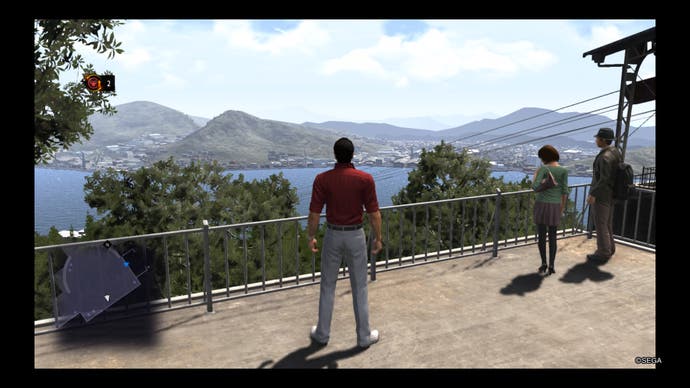
Onomichi, the latest in a row of settings all across Japan, felt less like a departure and more like a continuation of the idea that most of the things that happen in Yakuza are actually not about Kiryu at all. It's not his usual stomping ground, not another red light district. It's a place that's easily forgotten, just one more sleepy coastal stop on the way to Hiroshima proper.
Looking down from Senkoji temple in-game, you're treated to a stunning view of a cluster of small islands across the sea. The view itself is hardly unique for the area - just a few kilometres further west, you get a near identical view onto several different islands from Hiroshima harbour. I know this because I used to carry printed photos of that view with me everywhere after my boyfriend went to Hiroshima to visit family a decade ago in 2008.
For weeks beforehand, he would complain about the trip: how he didn't know the side of his family that had remained in Japan, how he didn't like flying, how he dreaded the prospect of being dragged around for sightseeing. I was used to him being very hard to impress at the best of times, so when he returned a changed man weeks later, gushing over the sight of mountains and the vague shapes of a few temples across the sea, I could hardly believe my ears.
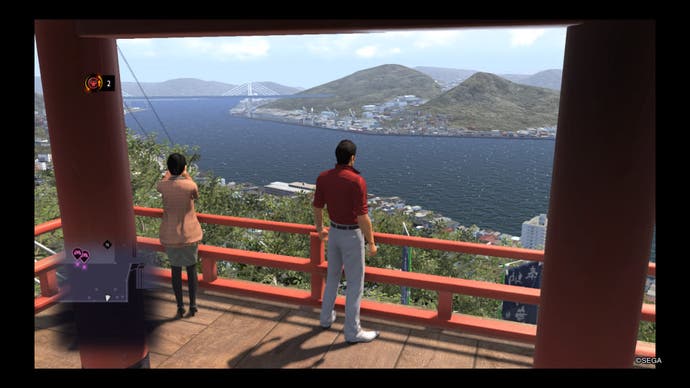
With me set to go to university, we vowed we'd go back and enjoy the view together. For the next three years, we worked on our goal - for me this meant studying to earn my year abroad in Japan, while he was looking for a job there so we could live together.
In early 2011, our work at least partly paid off. He had left for Japan ahead of me to go job hunting, once again living with his family and sending me pictures of the view from the harbour. When he finally found a job he truly liked, it was in Sendai, hundreds of miles from where I was going to study. We argued endlessly about it, but he applied and was determined to attend the interview in March of that year. The last time I heard from him was when he left for Sendai on the 10th of March, 2011, the day before the Tohoku earthquake and tsunami hit the pacific coast of Japan, parts of Sendai among them. He belongs to 2539 missing people who have never been found in any of the rescue efforts that followed.
Now, seven years after saying goodbye to a loved one, Yakuza 6 reminded me of the view he loved so much. After stepping into the game in 2012, the game stepped into my life in turn, unearthing a memory of an unbelievably difficult time in my life I still wouldn't miss for the world. For all that I had avoided the visit to Hiroshima for the longest time, and hated it when I took the trip with wounds yet too raw, connecting to a game in this way, a game that asked nothing of me than to enjoy the view, was all I ever could have asked for.
Unintentionally, Yakuza 6 showed me that it's okay to let go of your troubles, both the fictional video game ones and the real ones, to just enjoy the view for a moment. After all, the world keeps turning.
